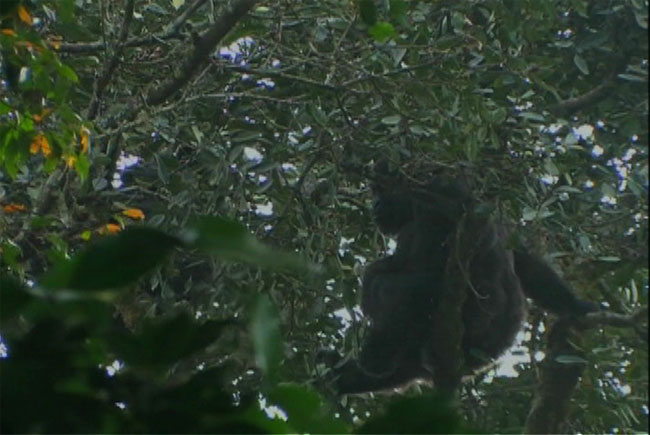Most Elusive Gorilla Caught on Video

The world's rarest and most camera shy great ape has come out of hiding on a forested mountain in Cameroon, where scientists have captured video and photos of the primate.
The minutes-worth of footage marks the first professional video of the animal, revealing two such Cross River gorillas (Gorilla gorilla diehli) snacking on figs about 30 to 40 feet (9 to 12 meters) above the forest floor. While the video may not be crystal clear, scientists are ecstatic to capture even blurry footage of these hairy actors.
"These gorillas are extremely wary of humans and are very difficult to photograph or film," said Roger Fotso, director of the Wildlife Conservation Society's (WCS) Cameroon Program. "Eventually, we identified and staked out some of the gorillas' favorite fig trees, which is where we finally achieved our goal."
The only previous footage of the Cross River gorilla (one of two subspecies of western gorilla) was taken from a long distance with a shaky, hand-held camera in 2005.
Besides the elusiveness of these primates, their steep and mountainous home made capturing video a time-consuming and sometimes treacherous endeavor. But after weeks of effort, WCS scientists and a film crew from NDR Naturfilm in Germany managed to get video of the gorillas earlier this year in the Kagwene Gorilla Sanctuary, a protected area created in 2008.
Fotso and colleagues hope the film will draw public awareness to the most endangered African ape and one of the world's 25 most endangered primate species, according to WCS. Their population hovers at fewer than 300 individuals, which are found only along the southern section of the Nigeria-Cameroon border. In fact, they were once thought extinct until resurfacing in the 1980s.
While many gorilla populations are threatened by poachers, the gorillas of Kagwene have been protected by the local belief that the apes are people and therefore cannot be hunted or consumed.
Get the world’s most fascinating discoveries delivered straight to your inbox.
Elsewhere, hunting continues to be one of the biggest threats to Cross River gorillas in addition to habitat destruction, according to WCS.



